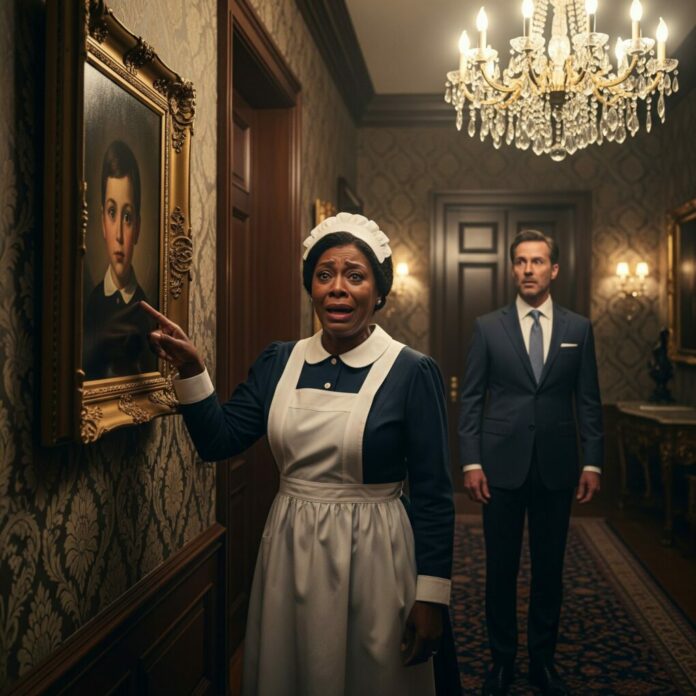
Ethan Morera had everything a man could dream of—wealth, reputation, and power. At forty, he owned several tech companies across the United States, his name often appearing in business magazines and leadership conferences. His mansion in San Francisco overlooked the bay, filled with priceless art and polished marble floors that echoed with silence. To the world, Ethan was a success story. But behind closed doors, the house felt empty—too big, too quiet, and too full of memories that refused to die.
When he was eight, Ethan had a little brother named Leo. The two were inseparable, spending afternoons playing soccer in their backyard while their mother played the piano inside. But one Sunday at a crowded park, Leo disappeared. The police searched for months. His parents never recovered. His mother withdrew from the world, and his father buried himself in work until he collapsed from exhaustion. Ethan grew up with a single unspoken promise: I will find him.
Thirty years passed, and Ethan never forgot. But life taught him that searching for ghosts was not something the world rewarded. So he hid the pain and became someone no one could break.
One afternoon, a new housemaid named Amara, a gentle Black woman in her early fifties, paused in the hallway near a portrait. It was a painting of Leo as a child—wide eyes, soft expression, holding a toy airplane. Ethan rarely looked at it anymore, but he kept it there because removing it felt like abandoning hope completely.
Amara’s eyes widened. Her hands trembled.
“Sir,” she whispered, voice cracking, “that boy… I know him.”
Ethan turned sharply. “You know him? That’s impossible.”
Amara swallowed hard. “He lived with me… in the Saint Vincent orphanage in Texas. We never knew his real last name. We called him Daniel.”
Ethan felt his heart stop.
“Daniel?” he repeated, slowly, painfully.
“Yes,” Amara said, tears forming. “And he always said—he had an older brother who called him ‘my little champion.’”
The words struck Ethan like lightning. My little champion was what he used to call Leo when they played soccer.
The room fell silent.
Amara looked up, voice shaking:
“Sir… I think the boy in the painting is alive.”
Ethan didn’t sleep that night. The memories he had forced himself to bury came rushing back—his mother’s trembling hands over piano keys, his father’s broken voice, and his own young promise whispered to an empty sky. If Amara was telling the truth, then Leo had been alive all along—lost but not gone.
The next morning, he asked Amara to sit with him in his study. The room was lined with law books, business records, and framed awards—but now, none of it mattered.
“Tell me everything you remember,” he said, trying to keep his voice steady.
Amara explained that Daniel had been brought to the orphanage around age six. The woman who dropped him off claimed his parents died in a car accident and that he had no remaining relatives. He was quiet but kind, always drawing pictures of a house with ivy on the walls and a piano near a sunlit window. No one believed his stories about a wealthy family or an older brother who promised to protect him—except Amara.
“He always said you would come,” she whispered.
Ethan swallowed hard, holding back tears.
“But one night,” Amara continued, “after an argument with older boys, Daniel ran away. The police searched for weeks, but he vanished.”
There was only one place left to start: the orphanage itself.
They traveled to Texas, where Saint Vincent stood in a quiet rural town. The paint on the building was faded, the playground rusted, but the halls still echoed with voices long gone. Sister Margaret, now elderly, recognized the portrait immediately.
“Yes,” she whispered. “That’s Daniel.”
They asked if he left anything behind. The nun nodded and returned with a worn folder. Inside was a single drawing: two boys holding hands in front of a piano.
Beneath it, written in uneven child handwriting:
“My name is Leo Morera. One day my brother will find me.”
Ethan broke down. His hands shook as he traced the letters. The pain of thirty years pressed heavy against his chest, but beneath it, a spark ignited—hope.
Sister Margaret added, “Years later, a boy matching his description was found injured near a highway. Hospital records listed his name as Lucas Daniel Morera. He left after recovery and traveled south.”
It was the first real lead in decades.
“We find him,” Ethan said, voice trembling but firm. “No matter what it takes.”
Ethan and Amara followed the trail across states. Months passed. Every lead felt fragile, every discovery uncertain. But the idea that Leo was out there—somewhere—kept Ethan moving.
Finally, they reached a small artistic town in New Mexico known for street painters and musicians. As they walked through the town square, the afternoon sun glowed warm against the brick buildings. Children laughed, vendors chatted, and life moved as if the world had never known heartbreak.
Then Amara stopped.
“Ethan,” she whispered. “There.”
Under a striped canopy sat a man painting a portrait of a young girl. His hair was slightly overgrown, his clothes simple, but his face—there was no doubt. The same soft eyes. The same shape of the jaw. Older now. But undeniably, undeniably Leo.
Ethan’s breath caught. His legs felt weak.
Amara approached first. “Daniel,” she called softly.
The man looked up.
Recognition flickered. Slowly. Carefully. Like someone waking from a long dream.
Then Ethan stepped forward. His voice broke into pieces.
“Leo… it’s me.”
Leo’s wings of memory trembled. His eyes filled with tears as Ethan unfolded the drawing—the one from the orphanage.
“I used to draw this house,” Leo whispered, voice cracking. “The piano. I didn’t remember names. But I remembered… love.”
Ethan reached him, pulling him into an embrace that thirty years had not been able to destroy.
Cars passed. People walked by. But for a moment, the world held still.
Two brothers finally home.
In the months that followed, Leo moved into Ethan’s home. The piano that had been silent for decades began to sing again. They visited their mother’s favorite places, rebuilt trust, and learned to speak without fear of losing each other again.
Instead of seeking revenge on the woman who took Leo, Ethan made a different choice. He founded The Helena Foundation, named after their mother—an organization dedicated to reuniting missing children with their families.
At the opening ceremony, Leo said softly:
“Love doesn’t disappear. It waits.”
If this story touched you, please share it — someone out there still believes they’re forgotten.
News
VACC supports driver’s complaints vs Rhian, Michelle, Samantha
(Left photo) Rhian Ramos, Samantha Panlilio, and Michelle Dee are facing accusations of torture and serious illegal detention filed by…
Are Katrina Halili and Kris Lawrence Back Together? Netizens Go Wild Over Viral Video That Rekindles Old Flames
One video. A few smiles. A familiar chemistry.And suddenly, the internet is asking the question everyone thought was long buried…
atrina Halili and Kris Lawrence were “together again” in a sweet moment, causing Katie Halos to shed tears of happiness.
Together Again: Katrina Halili, Kris Lawrence, and a Reunion That Spoke of Healing and Family In the world of entertainment,…
FROM SILENCE TO EXPLOSION: Robin Padilla Lays the Cards on the Table, PBBM Faces Political Turmoil!
From Silence to Open Discourse: Robin Padilla Speaks Out as PBBM Faces a Defining Political Moment In politics, silence can…
THE UNIFORM THAT BEGAN THE AWAKENING
The entire living room was silent when I entered. Not because anyone was impressed— but because no one noticed me…
ANG TAHIMIK NA PANALO: …Ngumiti lang si Lisa.
Hindi siya sumagot agad. Hindi niya tinanggihan. Hindi rin niya ipinagtanggol ang sarili. Basta dahan-dahan lang siyang humigop ng iced…
End of content
No more pages to load












